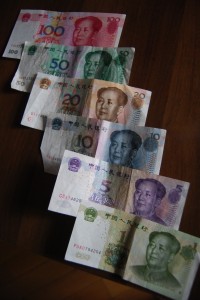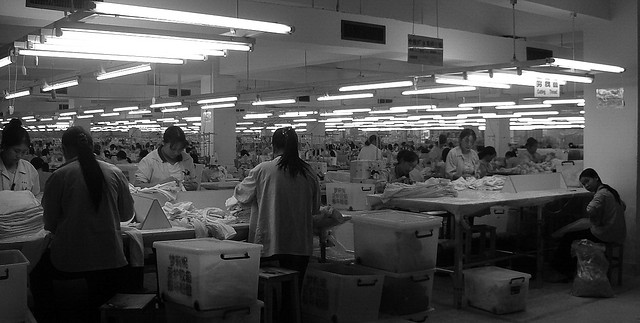What’s it Really Like Working in China? Posted by sasha on May 4, 2015 in Uncategorized
In the last post, we looked at the workforce in China – past, present, and future. Since the late 1970s, China has been undergoing one of the greatest transformations in the history of the world, going from a predominantly rural, agricultural, state-owned economy to a more urban, privatized economy focused on manufacturing and infrastructure. Thanks to the successes of the one child policy and the decades of economic growth, the country also now faces a greying population and labor shortage. While there are certainly issues that will need to be confronted moving forward, there are still hundreds of millions of people currently working in China. So, what exactly is it like working in China?
Two Extremes
Many Westerners believe the vast majority of Chinese people work in factories with a grueling schedule and little pay. This makes sense, as those who have no experience in China simply know what they see on TV, which in recent years has included many news reports detailing grim conditions in factories. The images of the “suicide nets” outside of Foxconn factories are hard to forget once you’ve seen them.
An ABC News report on the Foxconn factories, where Apple gadgets are made.
While there are certainly plenty of stories such as this about over-worked, under-paid workers in China, there’s also the ever-expanding class of nouveau rich. There’s even a word to describe them – tuhao (土豪 – tǔ háo). In the past, this word was used to describe domineering landlords, but in modern times it refers to the country’s nouveau rich – former peasants who struck it rich but don’t exactly know how to act with their newfound wealth. Think of the guy who pulls up to the club in his new BMW, chugs red wine like it’s going out of style, trashes the place, and then tries to get back in his car.
https://www.youtube.com/watch?v=9yPsPi3fTB8
BBC takes a look at the reemergence of the word “tuhao.”
GQ looks at China’s rich in a mini-series called “The Bling Dynasty.”
So we’ve got people slaving away making iPads 60 hours a week for a measly $2 an hour, and then we’ve got farmers-cum-millionaires who flaunt their wealth in tacky and superfluous ways, much to the chagrin of the normal folks. Talk about two extremes! It’s true that income inequality has gotten exponentially worse in recent years in China, but how about the country’s growing middle class? To understand work life in China a bit more, here are a few things to think about:
Minimum Wage

How much is minimum wage?
China does not have a national minimum wage; rather, each province, municipality, and region sets their own. To complicate matters more, each province is also split into different districts. A few things are taken into consideration when setting a minimum wage:
- Minimum living costs of local employees and their dependents
- The consumer price index for urban residents
- Social security and housing fund contributions paid by individual employees
- The average wage of employees in the locality
- Level of economic development and the supply and demand of labour in the locality.
Source: http://www.clb.org.hk/en/content/wages-china
In addition, wages are supposed to increase in accordance with the local cost of living. Just last year, many different provinces and regions enacted a substantial increase in the minimum wage. Thanks to these increases, China now falls somewhere in the middle when it comes to Asian countries – still far behind Japan and Singapre, but ahead of places like Thailand and Vietnam.
Discussing minimum wage increases in China.
Not surprisingly, the places with the highest minimum wage are the more developed coastal regions and those with the lowest are in the less developed central and western areas. Shanghai boasts the highest monthly minimum wage at 1,820 RMB ($293), while the southwestern province of Guizhou comes out on the bottom at 1,030 ($166). You may be surprised to find that the far western region of Xinjiang has a rather high minimum wage; this has been put in place to encourage more migrant workers to move there. It should also be noted that it can vary greatly between districts in each province, with the capital city generally having a much higher minimum wage than the more rural areas. If you’re interested, you can check out the full table of minimum wages across China from last year.
Average Salaries
Beijingers discuss their salaries with CCTV.
When discussing the average wages in China, the first thing to note is the huge gap between migrant workers and the rest of the workforce. It’s true that wages have been going up for everyone on a yearly basis, but the gap between migrants and everyone else has been widening year to year as well. In 2012, the average national wage was about 3,400 RMB/month ($548), but it was only 2,300 ($370) for migrant workers. As mentioned above, wages have been going up annually for all, including migrants, so these numbers should already be a bit higher. The cost of living has quickly been rising as well, though, leaving many people scrambling to get by with little to no savings.
There was a lot of outcry online about average salaries in China when an online wage calculator revealed that the average annual salary for a private sector employee was 28,752 RMB ($4,755), just 38% of the global average and less than a cleaner in Thailand. While the regular folks don’t have a lot to get excited about, top executives sure do – they’re pulling in about ten times more than the average worker. In case you were curious, here are the Top 10 cities with the highest average salaries in China.
Work Days and Holidays

A typical crowd on a Chinese holiday.
According to Chinese laws, employees should not have to work more than eight hours a day or forty hours a week. Of course, there are loopholes to this and many people do end up working overtime without extra pay. When overtime is compensated, it’s supposed to be at these rates:
- Workdays – 150% of normal wages
- Rest days – compensatory leave or 200% of normal wages
- Holidays – 300% of normal wages
Workers should get at least one day of rest per week, with most jobs taking the weekend off. Speaking of time off, annual leave is calculated in China is calculated based on the amount of time you’ve worked:
- 1-10 years – 5 days
- 10-20 years – 10 days
- Over 20 years – 15 days
There are also seven public holidays in China that add up to eleven days off. Around the three bigger holidays – Spring Festival, Labor Day, and National Day – people usually get a few days off in a row but need to come in on the weekend before or after the holiday to make it up. As such, you might end up working 8-9 days in a row, having a week off, and then going back for another full week of work. With so many millions of people having the same time off, traveling during those times is not exactly fun or easy. Not surprisingly, many are unhappy about the holiday system.
Hopefully now you have a better understanding of exactly what it’s like working in China. It will be interesting to see how things develop here in the near future, whether it’s dealing with the greying population and labor shortage or developing into more of a consumption based economy, there are plenty of challenges facing the country moving forward. One thing’s for sure, though – the China you see today will surely be different before you know it.
A great piece from Al Jazeera about China’s labor pains.

Build vocabulary, practice pronunciation, and more with Transparent Language Online. Available anytime, anywhere, on any device.
About the Author: sasha
Sasha is an English teacher, writer, photographer, and videographer from the great state of Michigan. Upon graduating from Michigan State University, he moved to China and spent 5+ years living, working, studying, and traveling there. He also studied Indonesian Language & Culture in Bali for a year. He and his wife run the travel blog Grateful Gypsies, and they're currently trying the digital nomad lifestyle across Latin America.





Leave a comment: